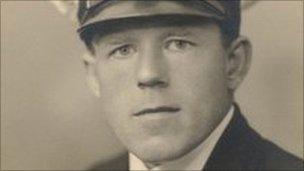World War I centenary: Pupils to visit battlefields
- Published
The government said there will be four years of "acts of remembrance" starting on the fourth of August 2014
Two pupils and a teacher from each state secondary school in England will be sent to visit French and Belgian battlefields to mark the World War I centenary, the government has said.
They will be asked to research local people who fought in the war as part of the £5.3m government-funded scheme.
A four-year £50m centenary programme will also include a candle-lit vigil at Westminster Abbey on 4 August 2014.
It will end at 2300 BST - exactly 100 years after war was declared.
Communities Secretary Eric Pickles said pupils sent on the battlefield trips, which will take place between spring 2013 and March 2019, would be able to "pay tribute to the fallen, to understand the scale of the suffering inflicted by the war to end all wars".
"Above all, these visits are a reminder that the First World War is not ancient history but a shared history that unites our country," he said.
"All of us have some connection with the conflict. No community was untouched by a family tragedy."
Culture Secretary Maria Miller, announcing the "national acts of remembrance", referred to a remark attributed to then-foreign secretary Viscount Edward Grey at the announcement of the war that "the lamps are going out all over Europe".
"A hundred years later, we will extinguish the last candle in Westminster Abbey to commemorate that hour as a mark of respect and remembrance that will set the tone for the events to come," she said.

Claude Choules, the last known combat veteran of World War I, died in 2011, aged 110.
She also revealed the vigil would be preceded on 4 August 2014 by wreath-laying at Glasgow's Cenotaph and at a military cemetery in Mons, Belgium, where British and German soldiers are buried.
She said the war saw "huge suffering and enormous sacrifice and our centenary programme will mark it with both sorrow and pride, as is fitting".
"Those four years changed British society forever and it is absolutely vital that we all remember the price paid," she said.
'Share heritage'
Ms Miller said the "centrepiece" of the commemorations would be the reopening of London's Imperial War Museum - founded in 1917 to record the ongoing conflict - following the refurbishment of its World War I galleries.
Other activities planned include:
Events to commemorate the start of the battles of the Somme, Jutland, Gallipoli and Passchendaele as well as Armistice Day
At least £15m from the Heritage Lottery Fund to help young people "conserve ,explore and share local heritage" of the war
An already-announced grant of up to £1m to transform HMS Caroline into a floating museum in Belfast
A £10m programme of cultural events
Meanwhile, critics say the government is not doing enough to explain the reasons behind the war.
Historian Sir Max Hastings said ministers had taken a "non-judgemental approach".
He told BBC Radio 4's Today programme they were "not willing to say outright what the historians I most respect believe, which is the First World War was not morally different from the Second World War - it was an unspeakable experience for Europe and the British people but it was for a cause worth fighting".
He said it was "as important that we prevailed over the Germany of that period as it was over the Germany of the Nazi era".
"The government is never slow to say that Hitler was to blame for the Second World War. I think the government is very frightened of taking any sort of view that might suggest we upset the Germans all over again."
But Ms Miller, also speaking to Today, said: "I think the role of the government here is clearly to help to set out the facts so that people can make their own minds up.
"I think in Britain we have fantastic historians who are able to do that for us."
The last known combat veteran of World War I, Claude Choules, died in Australia in 2011, aged 110.
Known to his comrades as Chuckles, British-born Mr Choules joined the Royal Navy at 15 and went on to serve on HMS Revenge.
- Published11 October 2012
- Published5 May 2011